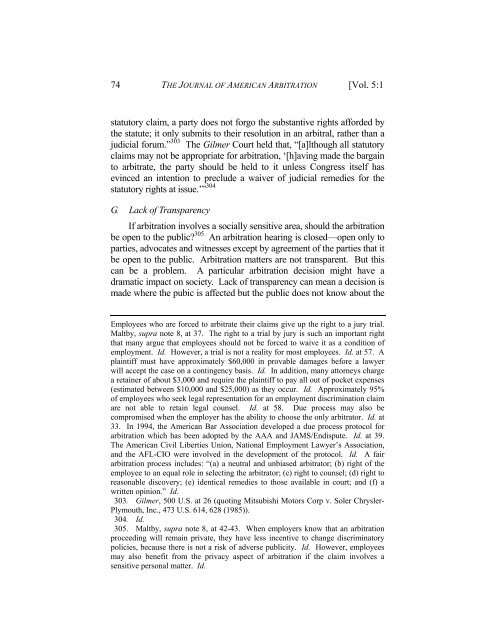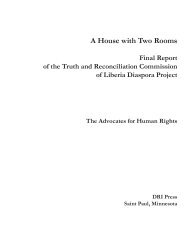2006/Vol. 5 No.1 - Hamline Law - Hamline University
2006/Vol. 5 No.1 - Hamline Law - Hamline University
2006/Vol. 5 No.1 - Hamline Law - Hamline University
Create successful ePaper yourself
Turn your PDF publications into a flip-book with our unique Google optimized e-Paper software.
74 THE JOURNAL OF AMERICAN ARBITRATION [<strong>Vol</strong>. 5:1<br />
statutory claim, a party does not forgo the substantive rights afforded by<br />
the statute; it only submits to their resolution in an arbitral, rather than a<br />
judicial forum.” 303 The Gilmer Court held that, “[a]lthough all statutory<br />
claims may not be appropriate for arbitration, ‘[h]aving made the bargain<br />
to arbitrate, the party should be held to it unless Congress itself has<br />
evinced an intention to preclude a waiver of judicial remedies for the<br />
statutory rights at issue.’” 304<br />
G. Lack of Transparency<br />
If arbitration involves a socially sensitive area, should the arbitration<br />
be open to the public? 305 An arbitration hearing is closed—open only to<br />
parties, advocates and witnesses except by agreement of the parties that it<br />
be open to the public. Arbitration matters are not transparent. But this<br />
can be a problem. A particular arbitration decision might have a<br />
dramatic impact on society. Lack of transparency can mean a decision is<br />
made where the pubic is affected but the public does not know about the<br />
Employees who are forced to arbitrate their claims give up the right to a jury trial.<br />
Maltby, supra note 8, at 37. The right to a trial by jury is such an important right<br />
that many argue that employees should not be forced to waive it as a condition of<br />
employment. Id. However, a trial is not a reality for most employees. Id. at 57. A<br />
plaintiff must have approximately $60,000 in provable damages before a lawyer<br />
will accept the case on a contingency basis. Id. In addition, many attorneys charge<br />
a retainer of about $3,000 and require the plaintiff to pay all out of pocket expenses<br />
(estimated between $10,000 and $25,000) as they occur. Id. Approximately 95%<br />
of employees who seek legal representation for an employment discrimination claim<br />
are not able to retain legal counsel. Id. at 58. Due process may also be<br />
compromised when the employer has the ability to choose the only arbitrator. Id. at<br />
33. In 1994, the American Bar Association developed a due process protocol for<br />
arbitration which has been adopted by the AAA and JAMS/Endispute. Id. at 39.<br />
The American Civil Liberties Union, National Employment <strong>Law</strong>yer’s Association,<br />
and the AFL-CIO were involved in the development of the protocol. Id. A fair<br />
arbitration process includes: “(a) a neutral and unbiased arbitrator; (b) right of the<br />
employee to an equal role in selecting the arbitrator; (c) right to counsel; (d) right to<br />
reasonable discovery; (e) identical remedies to those available in court; and (f) a<br />
written opinion.” Id.<br />
303. Gilmer, 500 U.S. at 26 (quoting Mitsubishi Motors Corp v. Soler Chrysler-<br />
Plymouth, Inc., 473 U.S. 614, 628 (1985)).<br />
304. Id.<br />
305. Maltby, supra note 8, at 42-43. When employers know that an arbitration<br />
proceeding will remain private, they have less incentive to change discriminatory<br />
policies, because there is not a risk of adverse publicity. Id. However, employees<br />
may also benefit from the privacy aspect of arbitration if the claim involves a<br />
sensitive personal matter. Id.
















